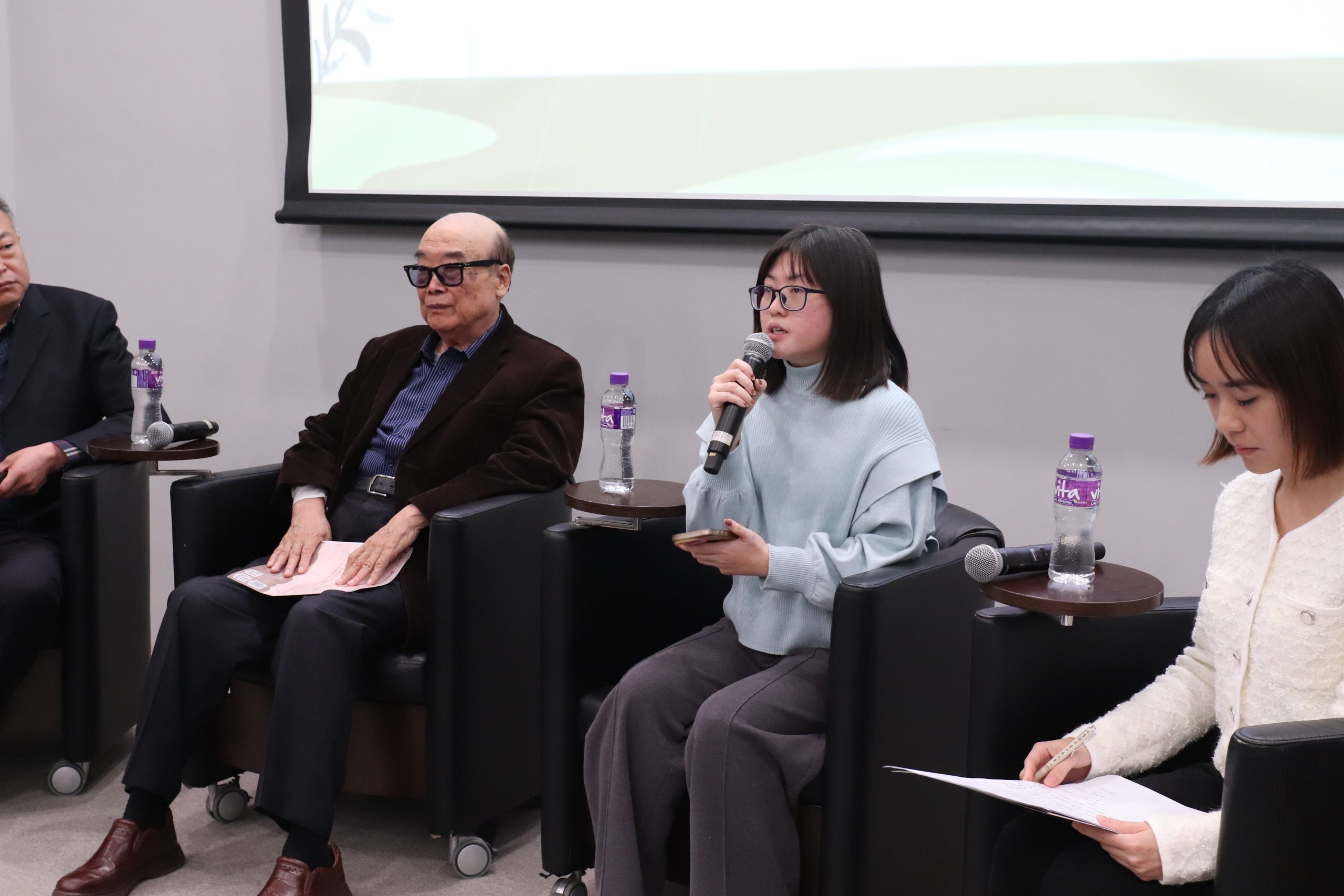News Express: College members from five universities participate in study camp at UM
jasonleong2025-03-16T00:00:03+08:00

澳大珍禧書院舉行成立15周年慶典活動
UM Henry Fok Pearl Jubilee College celebrates its 15th anniversary
五校書院共慶澳大珍禧書院成立15周年
澳門大學霍英東珍禧書院在2025年1月12至16日舉辦五校書院聯誼活動,邀請香港中文大學和聲書院、香港中文大學(深圳)學勤書院、清華大學秀鍾書院以及西安交通大學南洋書院的師生參與研學營,為霍英東珍禧書院成立15周年慶典活動拉開序幕。
晚宴上,澳大校長宋永華回顧了澳大珍禧書院成立以來的輝煌歷程,對其在培養學生的領導力、全球競爭力和公民責任心等方面所取得的成就表示讚賞,並鼓勵繼續加強與國內外高校書院的交流與合作。晚宴的亮點之一是澳大珍禧書院與其他書院的學生一同演繹合唱曲目《為何高唱》,悠揚動聽的旋律和富有感染力的演出,將現場氣氛推向高潮。
是次晚宴為五校書院聯誼活動的行程之一。五校師生亦參與了多個訪問學習活動,其中包括參觀橫琴粵澳深度合作區規劃展示廳,了解深合區的發展前景;到訪宇信科技橫琴分公司,學習金融科技創新;訪問臻林國際康養度假園,了解康健療養酒店的發展理念。他們還考察了澳門的世界遺產歷史城區、度假村酒店的的環保工程、氹仔和路環的舊區活化工程等,增強對環境保護和可持續發展的認識。澳大人文學院助理教授邵朝陽亦以“媽閣不是座城”開講,讓五校師生從澳門的歷史變遷、文化遺產角度了解澳門的包容性特徵,深刻領悟到“一國兩制”是澳門特別行政區成立以來保持長期繁榮穩定的最佳制度安排。
澳大珍禧書院院生盧嘉瀅表示,活動可以和不同學校的學生交流,對不同大學的書院制度也有了更深入的了解,對日後舉辦書院活動有更多的構想。香港中文大學和聲書院院生Jidapa表示,作為一名來自泰國的學生,透過活動認識到來自不同學校的學生,在交流中發現不同文化的趣味。香港中文大學(深圳)學勤書院院生陳則源表示,活動讓他有機會了解到內地企業,對未來的學習和職業規劃有了更深的思考。清華大學秀鍾書院院生李天亮表示,是次活動不僅讓他感受到了澳門開放兼容的文化,也看到了澳門作為世界旅遊休閒中心在可持續發展方面的努力和成就。西安交通大學南洋書院院生楊東冉表示,交流活動令他深受啟發,對如何有效組織活動、提升參與度,以及增強團隊合作有了新的見解。
是次活動不僅為五校師生提供了寶貴的學習與交流機會,也為各書院在書院制辦學、實踐創新、文化育人和可持續發展等方面的深入交流合作奠定了基礎。
欲瀏覽官網版可登入以下連結:
https://www.um.edu.mo/zh-hant/news-and-press-releases/press-release/detail/60291/
Five colleges celebrate UM Henry Fok Pearl Jubilee College’s 15th anniversary
Henry Fok Pearl Jubilee College (HFPJC) of the University of Macau (UM) held a study camp from 12 to 16 January 2025 for faculty and students from Lee Woo Sing College of the Chinese University of Hong Kong (CUHK), Diligentia College of the Chinese University of Hong Kong (Shenzhen), Xiuzhong College of Tsinghua University, and Nanyang College of Xi’an Jiaotong University. During the camp, members of the five colleges gathered to celebrate the 15th anniversary of HFPJC.
HFPJC hosted a high table dinner as part of the study camp. At the dinner, UM Rector Yonghua Song delivered a speech, in which he highlighted HFPJC’s remarkable development over the past 15 years, and praised the college’s achievements in cultivating students’ leadership, global competitiveness, and responsible citizenship. He also encouraged HFPJC to strengthen exchanges and cooperation with colleges of universities at home and abroad. One of the highlights of the event was a choral performance of the song ‘Why We Sing’ by students of HFPJC and the visiting colleges, who impressed the audience with their enchanting and captivating performance.
In addition, faculty and students from the five universities participated in several visits. They visited the Exhibition Hall of the Guangdong-Macao In-Depth Cooperation Zone in Hengqin to learn about the development prospects of the Cooperation Zone. They visited the Hengqin branch of Yusys Technologies to gain insights into fintech innovation, and toured Serensia Woods to learn about the development concepts of wellness hotels. During their time in Macao, they explored the UNESCO World Heritage Historic Centre, green construction projects of resort hotels, and revitalisation projects in Taipa and Coloane. These visits enhanced their understanding of environmental protection and sustainable development. Sio Chio Ieong, assistant professor in the Faculty of Arts and Humanities of UM, gave a talk titled ‘Macao is Not Just a City’, where members of the five universities learned about Macao’s inclusiveness from the aspects of its history, development, and cultural heritage. They also learned about the significance of the ‘one country, two systems’ policy in maintaining Macao’s long-term prosperity and stability.
Lu Jiaying, a student from UM HFPJC, said that the study camp enabled her to interact with students from different universities, gain a deeper understanding of the residential college system of different universities, and get inspiration for new ideas for college activities. Jidapa, a student from CUHK’s Lee Woo Sing College, noted that as a student from Thailand, she enjoyed meeting students from different universities and discovering cultural diversity through interaction with them. Chen Zeyuan, a student from CUHK-Shenzhen’s Diligentia College, mentioned that the visits gave him insights into mainland enterprises, which is useful for his academic and career development. Li Tianliang, a student from Tsinghua University’s Xiuzhong College, said that the study camp allowed him to experience Macao’s open and inclusive culture while witnessing the city’s efforts and achievements in sustainable development as a world centre of tourism and leisure. Yang Dongran, a student from Xi’an Jiaotong University’s Nanyang College, said that the exchange activities were inspiring and he gained new perspectives on how to organise events effectively, enhance participation, and promote teamwork.
The above activities not only provided valuable learning and exchange opportunities for faculty and students from the five universities but also laid the foundation for in-depth cooperation in residential college education, innovative practices, cultural exchange, and sustainable development.
To read the news on UM’s official website, please visit the following link:
https://www.um.edu.mo/news-and-press-releases/press-release/detail/60291/








